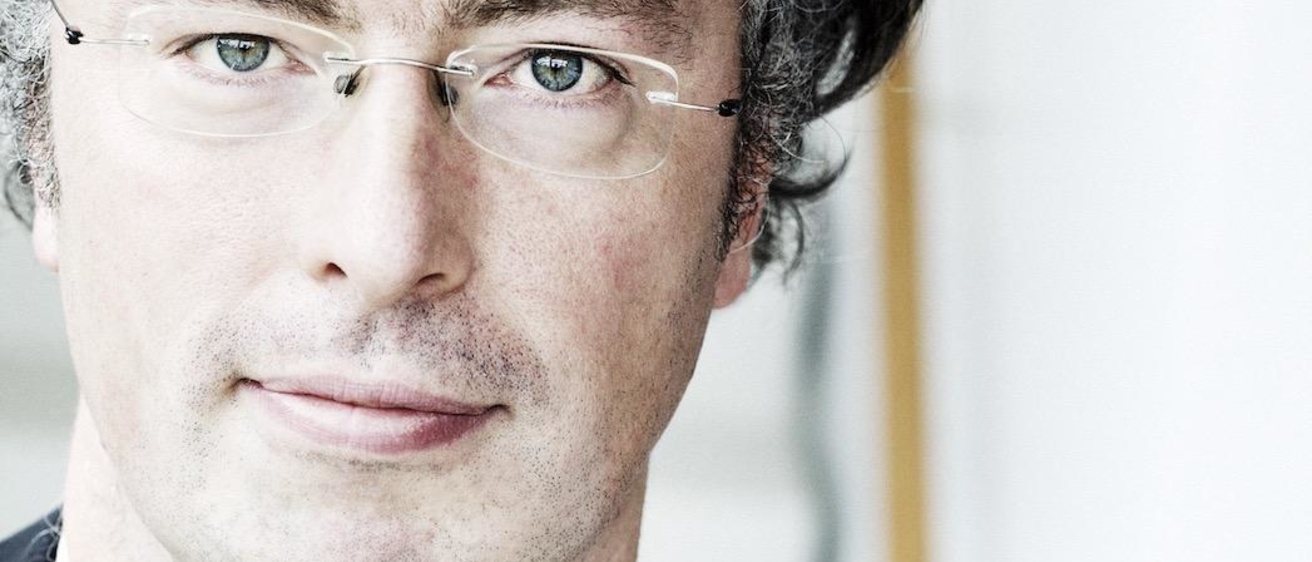Have you ever wondered what happens in your brain when you look at a piece of art or listen to a new song? Why do goosebumps collect on your arms? And how can these experiences benefit your health? These are among the many questions that Fredrik Ullén, a visiting scholar-artist, posed for students, faculty, and members of the Iowa City community. Ullén’s visit was a great way to kick off the fall semester, presenting rigorous research on the mind and music, while also offering a chilling display of melodic mastery on the piano.
In collaboration with the School of Music and the College of Liberal Arts and Sciences (CLAS), the Iowa Neuroscience Institute (INI) brought Ullén to campus from Sept 4-6, 2023, as part of a mission to illuminate how our understanding of the brain informs, and is informed by, the arts and humanities.
Exemplifying a career that blends the arts and sciences, Ullén is not only an internationally-renowned pianist whose impressive repertoire includes some of the most complex works written for the piano by composers such as Ligeti, Sorabji, and Messiaen. He is also the Director of Cognitive Neuropsychology at the Max Planck Institute of Empirical Aesthetics in Frankfurt, Germany—the only research facility in the world solely dedicated to interdisciplinary research on aesthetics.
“It’s an important part of human psychology,” Ullén explains. “We have these implicit judgements of what we like and what we don’t that we describe in aesthetical terms. We have it in relation to arts and music, but also in our relation to landscapes, our surroundings, and, of course, other people.”
The Max Planck Institute provides scientific frameworks for investigating questions of reception and aesthetic processing that influence life choices, such as where we live, how we dress, what activities we pursue, and who we spend time with. Ullén and his colleagues are interested in understanding these responses and preferences psychologically and neurologically but also socially.
CLAS Associate Dean for Research Joshua Weiner, who also serves as associate director for Outreach and Education for the Iowa Neuroscience Institute, helped organize the event.
“At the University of Iowa, we strive to bring students, educators, and artists together to explore these fundamental questions of humanity, our environment, and emotions,” Weiner says. “Guest scholars and artists like Fredrik Ullén provide students with a model of interdisciplinary practice and integrated scholarship. The Iowa Neuroscience Institute encourages cross-disciplinary collaboration and invites conversation between artists, the humanities, and scientists.”
Ullén’s brief UI residency began with a seminar on September 5, in the Medical Education Research Facility (MERF) on the medical campus at Iowa. The lecture brought students and faculty from across campus to engage with Ullén’s research on music and gene-environment interplay—work that explores the extent to which musical expertise is influenced by a person’s genetic makeup or by their input of hard work and practice.
During the seminar, Ullén introduced music as both the subject of study as well as a tool for understanding skill learning, expertise, training, and creativity. One of his most exciting projects involves a grand piano.
“It’s a totally normal piano, but on top, we have equipment so you can read the movement signals of everything that’s going on and you can run it in playback. So, of course, we’re going to use this for concerts and artistically.,” he adds.
“We are now procuring equipment to record brain stimulation,” he enthused. “The idea is to have a lab where we can study the neurocontrol of music and performance under very natural conditions.”
While on campus, Ullén didn’t just connect art and science together—his visit also spurred new partnerships between Iowa researchers and Ullén’s team in Germany.
“Our department is still in a build-up phase. I’m still recruiting people, collaborators, and building new labs,” he added.
The following evening, Ullén gave an artist talk and piano recital in Voxman Music Building. As one of the foremost interpreters of György Ligeti’s work and the first pianist to record the second book of Ligeti’s études, Ullén treated the audience to a virtuoso performance enriched by educational descriptions of Ligeti’s history as well as his diverse range of sources including traditional Indonesian gamelan percussion, Hungarian folk, African polyrhythms, and Thelonious Monk.
“It’s Ligeti’s centennial,” Ullén told the rapt audience. “I put him on the shelf for a few years, and it was great to come back to his work and start disassembling and reassembling again. You always find new things.”
Before performing each piece, Ullén described the complex scores with vivid imagery, providing visual associations for the music. In the first piece, Désordre, the melody becomes rhythmically contracted at an increasingly rapid rate. “It’s like a black hole,” he said. For Vertige, he likened the movement to the illusions of cognitive scientist Roger Shepard, drawing upon his scientific expertise to interpret the challenging piece. Both the seminar and the recital were free and open to the community, bringing the university and Iowa City together to experience the possibilities that arise when the arts and sciences are brought into harmony.
